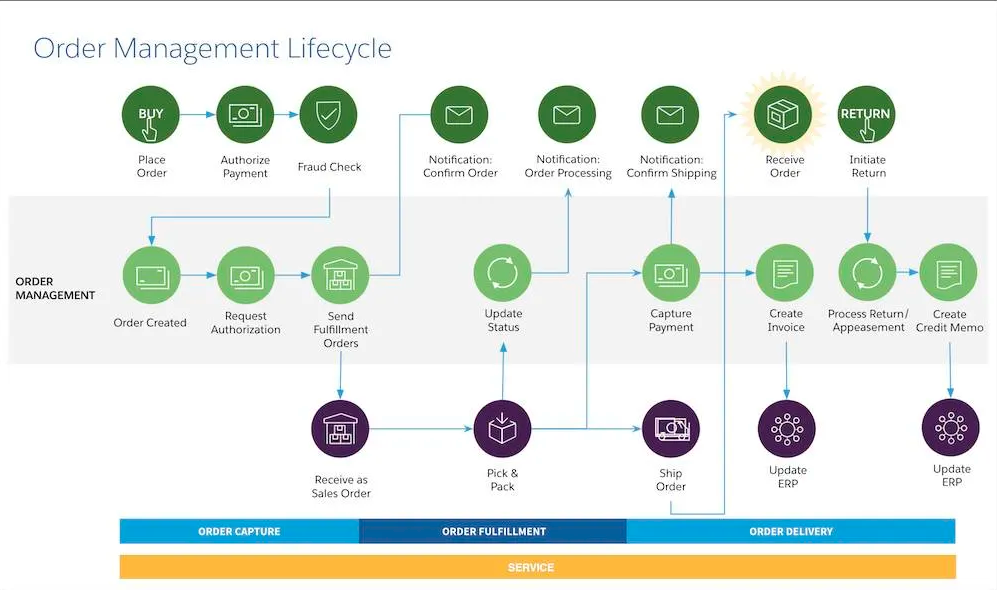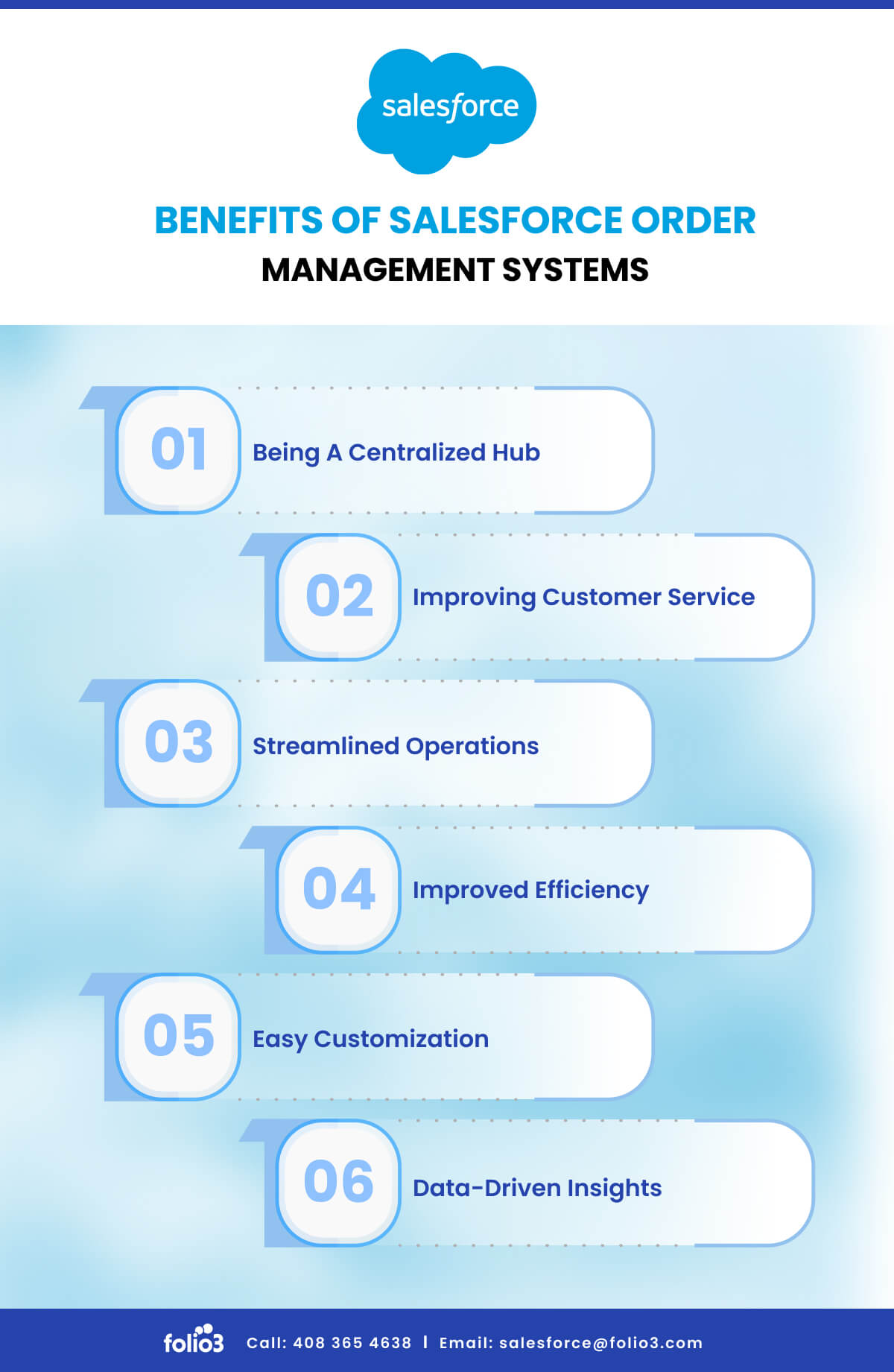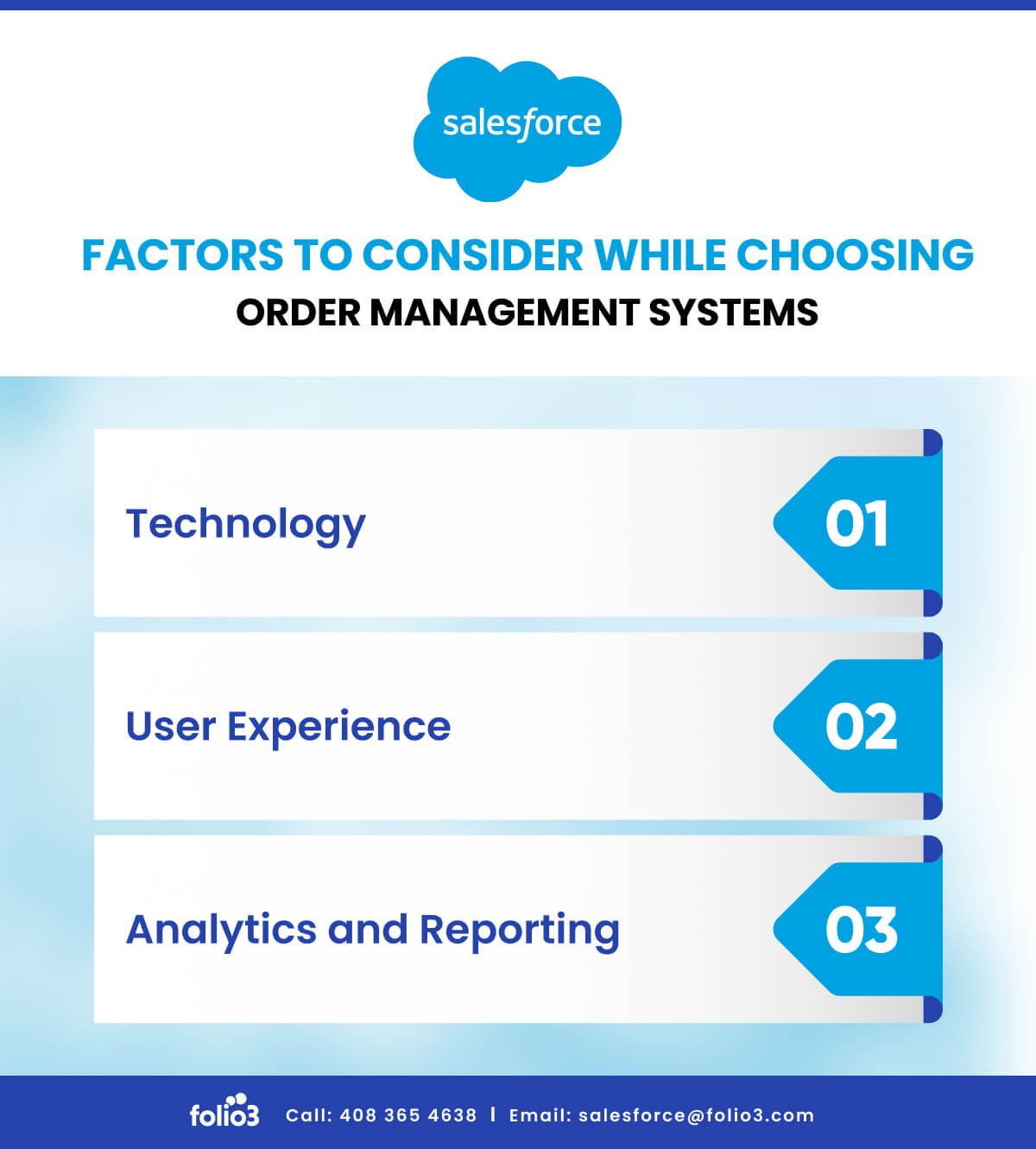An order management systems (OMS) is a software solution that automates and streamlines the order fulfillment process, enabling businesses to process orders quickly and accurately. Salesforce Commerce Cloud is a leading order management systems platform that helps companies manage orders, inventory, and customer data in a single, integrated system.
This blog will explore how Salesforce Commerce Cloud can help you streamline your order management processes, reduce costs, and improve customer satisfaction. Whether you’re a small business looking to improve your order management capabilities or a large enterprise seeking to optimize your OMS with Salesforce commerce cloud implementation, this blog is for you.
What Is Salesforce Order Management Systems?

Image Source: Salesforce Trailhead
It is a system that manages the end-to-end order lifecycle for all business sizes. It gives companies the tools to streamline order placement, processing, fulfillment, and delivery. Other key features of Salesforce order management systems include:
- Order capture
- Order fulfillment
- Inventory management
- Integration capabilities
- Customer service
- Reporting and analytics
- Customization and scalability
The Salesforce order management system is essential in helping businesses streamline various facets of the order process. As you read ahead, you will continue to learn more about it.
Benefits of Salesforce Order Management Systems
The Salesforce order management system is an essential tool for all businesses. Its benefits include:
Being A Centralized Hub
Salesforce order management systems act as a single location to manage different aspects of the order cycle. They manage order capture, fulfillment, logistics, and even after-sales support. Salesforce commerce cloud optimization and subsequent Salesforce commerce cloud migration further improve this.
Improving Customer Service
It allows customers to track orders in real-time and access other self-service options. Salesforce order management systems’ convenience and transparency translate to improved customer satisfaction scores.
Streamlined Operations
Your Salesforce order management system integrates with other Salesforce customer 360 products, such as B2C commerce, B2B commerce, and the Salesforce service cloud. The result eliminates data silos, and automated workflows align with streamlined order processing and fulfillment.
Improved Efficiency
Centralized order data and automated tasks help the SF OMS reduce manual work and improve various facets of your business. With more work done in less time, business efficiency improves significantly.
Easy Customization
Salesforce uses a ‘clicks-not-code’ approach that allows businesses to create customized workflows and functions tailored to their specific needs. This creates a truly unique experience for each business based on what they want and need. If you’re stuck somewhere, contact Salesforce commerce cloud support to find the best solution.
Data-Driven Insights
Like other Salesforce products, the OMS provides businesses essential data and subsequent insights about the order fulfillment process. The data can be used to identify performance bottlenecks, improve operational efficiency, and make more informed business decisions.
Why Is An Order Management System Crucial for a Successful Business?
Using an OMS is vital to businesses for a variety of reasons. They are crucial to the success of companies for a variety of companies, including:
- Improved accuracy and reduced errors
- Better inventory control
- Improved customer satisfaction
- Streamlined operations
- Improved decision making
- Scalability and growth
Having the SF OMS in your corner gives you an edge over those that don’t. It improves various aspects of the order fulfillment process, allowing your business to operate effortlessly. With Salesforce order management systems, you get some of the best in the industry to work with.
Why Use Salesforce Order Management Systems?
There are several order management systems to pick from. However, the Salesforce order management system offers unique benefits that set it apart from the rest:
Integration With The Salesforce Ecosystem
Several businesses already use various Salesforce products (B2C commerce, B2B commerce, Service Cloud). The order management system fits right into the Salesforce ecosystem, eliminating the need for complex third-party integrations and ensuring all customer data is in one place. Leveraging Salesforce commerce cloud development shows how well all services integrate with each other.
Scalability For Business Growth
Salesforce systems are well-known and documented for their ability to manage large workloads. The Salesforce management system is the right choice for businesses that have forecasted rapid growth. If you’re a business looking to grow, consider speaking with Salesforce commerce cloud consultants to better understand the products and offerings.
Ease Of Use And Customization
We mentioned the Salesforce ‘click-not-code’ approach, which prioritizes customization and user intuitiveness. The SF OMS creates tailored workflows and functionalities for their unique needs without having significant programming knowledge to make them all.
Customer-Centric Focus
The SF OMS considers customer experience. It offers real-time order tracking, returns management, and self-service options, all of which contribute to significantly improved customer satisfaction. The SF OMS helps keep customers happy, which is the best way to improve your business.
Factors to Consider While Choosing Order Management Systems
Choosing the right order management system requires considering several factors, including technology, user experience, and reporting and analytics.
Technology
When considering technology, keep the following in mind:
- Scalability. Can your OMS handle the current order volume and progressively grow with your business?
- Integrations. Does it integrate seamlessly with your ERP, CRM, and warehouse management systems? A seamless integration guarantees smoother data flow and eliminates data entry.
- Security. Does your preferred OMS have robust and reliable security controls? Protecting business and customer data at all times is imperative. Check whether your OMS has access controls, encryption, and a disaster recovery plan.
- Deployment. Does the OMS come with an on-premises, cloud-based, or hybrid deployment? Cloud-based deployments are the best because they are easier to implement and maintain. On-premises deployments give users more control over data security. A hybrid deployment leverages both features.
User Experience
For a quality user experience, look for this:
- Ease of use. Check whether the OMS is intuitive and user-friendly. Additionally, can employees learn how to operate and navigate it without much effort?
- Customized workflows. Does your preferred OMS let you create personalized workflows matching your business’s needs and processes?
- Mobile access. Look into whether the OMS comes with mobile access. This is particularly helpful for warehouse staff and sales reps who need to manage orders on the go.
Analytics and Reporting
For the best OMS analytics and reporting, here is what to look for:
- Reporting features. Check whether the OMS has different reports or dashboards to help track the order fulfillment process. Do these reports show order processing times, shipping costs, inventory levels, customer returns, and more?
- Data visualization. Does your OMS make visualizing data with charts, graphs, and other media easier? These tools help you identify patterns and trends in your data.
- Real-time insights. Your OMS should offer real-time insights during the order process to identify or address any issues that may arise.
What Core Components Make up the Salesforce Order Management Solution?
The core components of the Salesforce Order Management Solution include:
- Salesforce Order Management Data Model outlines the structure for storing all customer order data, including orders, products, order items, customer information, and addresses.
- Salesforce Order Management Workflows. These are automated processes that manage different parts of the order lifecycle stages. Various events trigger various stages (order placement, payment authorization, product shipment).
- Flow Core Actions for Order Management. Pre-built building blocks used to create workflows in the SF OMS. They let the OMS perform specific actions like adding order items, canceling orders, payment authorization, and managing returns.
- Lightning Web Components for Order Management. Reusable UI components that users can customize to create an intuitive SF OMS interface. An LWC displays order details, order progress, fulfillment management, and customer interactions.
- Integration with Order Salesforce Products. The SF OMS integrates with other SF products (B2C commerce, B2B Commerce, and Salesforce Commerce Cloud. Users get a unified view of all customer data and workflows across various departments for better communication throughout the order life cycle.
Conclusion
Mastering Order Management Systems with Salesforce Commerce Cloud is a strategic investment for businesses looking to streamline operations, enhance customer experiences, and drive growth. By leveraging Salesforce Commerce Cloud’s power, companies can optimize order processing, improve inventory management, and deliver seamless omnichannel experiences. Embracing this technology can revolutionize how businesses manage their orders and enhance efficiency and customer satisfaction.
FAQs
Can Salesforce Be Used as an Order Management System?
Salesforce is the platform on which the Salesforce Order Management manages the order process from start to finish.
Can Salesforce Do Purchase Orders?
Salesforce cannot directly make purchase orders, but third-party procurement software can handle them. Moreover, custom development in Salesforce also unlocks this functionality. Salesforce commerce cloud developers are tasked with weaving together powerful functionality that improves what Salesforce already offers.
Is Salesforce a Procurement Tool?
Salesforce is not a traditional procurement tool but can streamline the procurement process. The Salesforce Sales Cloud can manage supplier relationships, track quotations, and facilitate internal communications.

Hasan Mustafa
Engineering Manager Salesforce at Folio3
Hasan Mustafa delivers tailored Salesforce solutions to meet clients' specific requirements, overseeing the implementation of scenarios aligned with their needs. He leads a team of Salesforce Administrators and Developers, manages pre-sales activities, and spearheads an internal academy focused on educating and mentoring newcomers in understanding the Salesforce ecosystem and guiding them on their professional journey. Additionally, Hasan holds certification as an eCommerce expert, demonstrating an in-depth understanding of various eCommerce platforms such as Magento2, Shopify, BigCommerce, WooCommerce, and Shopware. His proficiency extends to modern technologies including React, Docker, AWS, and Google Cloud Platform. Hasan extends his professional services to businesses seeking specialized knowledge in Salesforce implementation and development.

